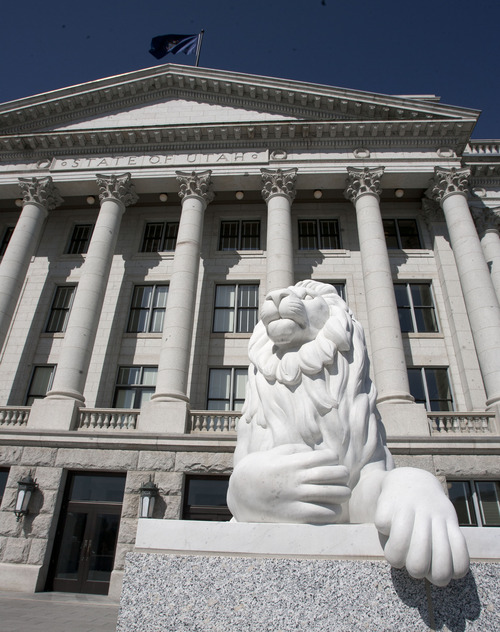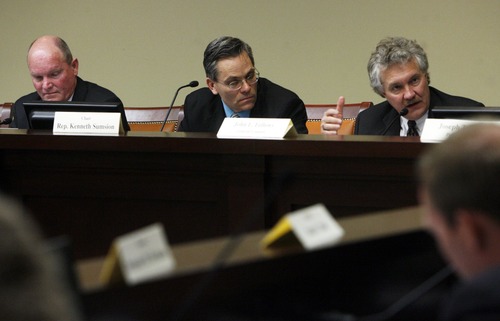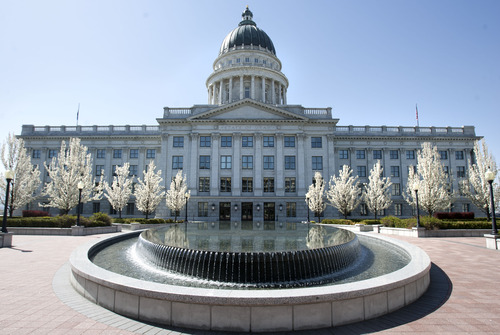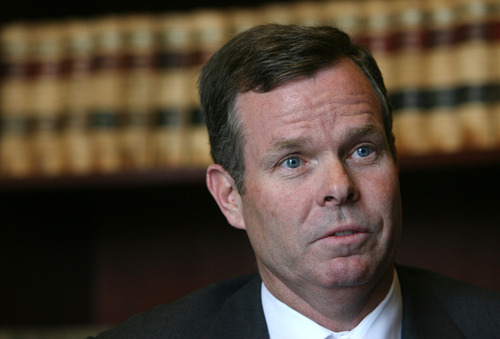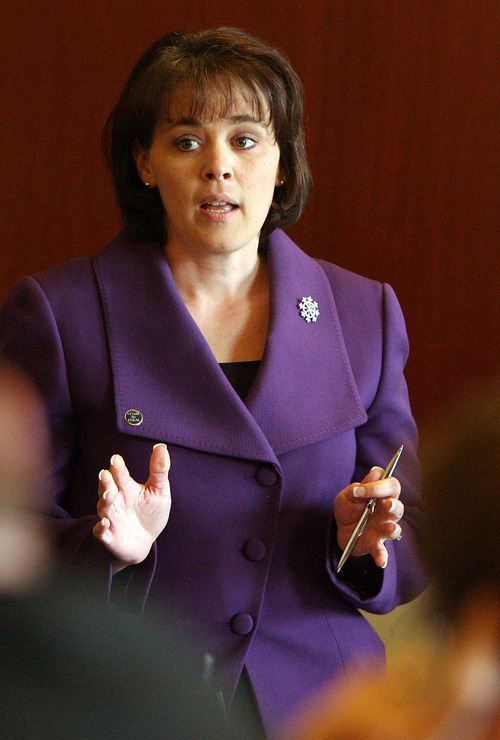This is an archived article that was published on sltrib.com in 2013, and information in the article may be outdated. It is provided only for personal research purposes and may not be reprinted.
As controversy over embattled Attorney General John Swallow has led legislators to dust off and study Utah's impeachment process, they find themselves in largely uncharted territory.
The state Legislature has never conducted an impeachment trial and has begun the process just once — a decade ago for a judge who resigned before the investigation could get underway.
That lack of precedence leaves lawmakers with wide latitude in deciding what an impeachable offense is, as well as how to investigate and prosecute it. It also raises questions about the cost of such an undertaking — though estimates range in the millions.
"I think the ultimate consideration is the public trust: Has the public trust been violated or lost," and would impeachment help restore it, says House Speaker Becky Lockhart, R-Provo.
Rep. Spencer Cox, R-Fairview, a freshman lawmaker and attorney, jumped into the debate recently when he said some of Swallow's spokespeople had distorted the threshold for impeachment.
"We are near the point that the only way to restore public trust in the attorney general's office will be to either absolve him or remove him from office. And the only way to do that is through impeachment proceedings," Cox said in an interview, echoing a blog that attracted widespread attention.
Swallow is under investigation by the FBI, Salt Lake and Davis County prosecutors, the lieutenant governor's office on numerous allegations, including that he helped broker deals to assist a businessman suspected of cheating customers and that he promised protection to potential donors to his predecessor, Mark Shurtleff. Swallow also faces at least two ethics complaints filed with the Utah State Bar.
The Utah House, which initiates impeachment, has been receiving a stream of emails and documents about the process from Lockhart in preparation for a June 19 House GOP caucus expected to be devoted to the topic.
—
Rarity • Lockhart says research by her and legislative staff members have found only two times in Utah history in which impeachment was even seriously considered.
One was in 2003, when the House passed a resolution to begin an impeachment investigation into 4th District Judge Ray M. Harding Jr., who was fighting drug charges. "He actually resigned before we went through the process," Lockhart says.
The other was in 1935, when legislators talked publicly about impeaching Secretary of State Milton Welling. "But they never went through with it," she says.
The lack of a track record means lawmakers have little precedent to guide them. But the Utah Constitution sets up a process and standards of impeachable offenses that are similar to the federal Constitution — with some key differences.
One contrast is in the first step toward impeachment.
—
First step • The Utah House must pass an impeachment resolution by a two-thirds vote before it can start an investigation, according to a memo from the legislative general counsel.
The U.S. House can investigate without that initial action — as the U.S. House Judiciary Committee investigated and voted to impeach President Richard Nixon, who resigned before the full House took any formal action against him.
The Utah Constitution and laws allow any House member to introduce a resolution to begin the impeachment process. The House speaker then has discretion — if the House is not in regular session — to poll members to find if two-thirds of them are in favor of convening an impeachment session to consider it, says House chief of staff Joe Pyrah.
If two-thirds want that session, then the speaker convenes it.
A resolution then needs to pass by a two-thirds majority for the process to continue.
Lockhart stresses that adopting such a resolution would mean only that members deem an investigation in order, not that they consider Swallow guilty. "You have to call the impeachment session in order to set up the process whereby you investigate the allegations," she says.
"One of the common mistakes about impeachment is that beginning the process somehow shows the person is guilty or not worthy of office," Cox says. "In Utah, the House doesn't have the ability to subpoena or investigate or hire a special counsel unless it passes that resolution first."
Cox adds, "Frankly, impeachment proceedings are appropriate when two-thirds of the House of Representatives feels like the public trust has been violated to such an extent that further investigation is needed."
Lockhart says she expects much of the conversation at the June 19 House GOP caucus will be about whether to take that step. "It's hard to say where the body is. I think you have the same kind of [range of] views and opinions as you have in the public," she says. "Impeachment is not a criminal proceeding. It is a political proceeding."
—
Investigation • Once the two-thirds hurdle for such a resolution is cleared, the House by simple majority approves a second resolution outlining how its investigation will proceed, including possibly appointing a special prosecutor or a committee to investigate.
Utah laws "grant virtually absolute discretion to the House and Senate to establish the detailed procedures for a particular impeachment," according to a memo to lawmakers from Legislative General Counsel John L. Fellows.
"The investigation can take an hour, a day, a month, a year," Lockhart says.
The Utah Constitution also gives lawmakers discretion about what is an impeachable offense, offering only a vague description of "high crimes, misdemeanors, or malfeasance in office."
Cox — who attended law school during the impeachment of President Bill Clinton, and had many in-depth discussions then about impeachable offenses — says they need not be crimes.
"There's this false narrative that's going around that's being perpetuated in part by the attorney general's own spokespeople that unless a crime was committed, you can't even talk about impeachment. That's clearly not the case nor should it be," he says. "You can have one really bad incident … or many lapses of judgment could rise to the level of an impeachable offense."
Lockhart agrees that an impeachable offense may be a breach of public trust that doesn't rise to the level of a crime. Again noting that impeachment is a political process that courts generally have opted not to interfere with, she says an impeachable offense is essentially anything that two-thirds of lawmakers agree it is.
—
Senate trial • After investigation, any resulting articles of impeachment — essentially an indictment — could be presented to the House, according to whatever procedure the House sets up in its resolution. Any article passed by a two-thirds vote is submitted to the Senate for trial.
One difference between the state and federal procedure is that, at this point, Utah law requires the impeached officer to be temporarily suspended from office until he or she is convicted or acquitted by the Senate. The governor would appoint a temporary replacement.
The Senate then establishes its own trial procedures — but two-thirds of senators must be in attendance for it to proceed. To convict and remove an officer, two-thirds of all senators — 20 of 29 — must approve at least one article of impeachment.
Of note, the Utah Constitution and laws allow an officer to be prosecuted criminally whether or not that officeholder is convicted or acquitted by the Senate.
—
Cost • As lawmakers have looked into the impeachment process, they have discovered that it could be expensive — perhaps $2 million to $5 million.
Lockhart says that is based on what other states have spent in impeachment proceedings.
"We do know that in some of the other states in their reports, when they have done impeachments, they spend $2 million, $3 million, $4 million, $5 million — in that range," depending on how involved investigations are, she says.
"The question is, can you put a price on public trust?" Lockhart says.
"Nobody enjoys any of this," Lockhart adds. "I want to make sure that we are careful about this... We don't want to make a mistake. We don't want to further erode the public trust based on what we do. … But if and when we move forward, we have to be ready." Impeachment rare in Utah, nationally
Utah • The state has never had an impeachment go to Senate trial. Only one official, 4th District Judge Ray M. Harding Jr. in 2003, had the House begin impeachment proceedings — but he resigned.
Other states • Just 13 state and territorial governors have been impeached — only eight have been removed from office in Senate trials. This year, Northern Marianas Gov. Benigno Fitial resigned after the territorial House impeached him. Illinois impeached and removed Gov. Rod Blagojevich in 2009; Arizona did the same with Gov. Evan Mecham in 1988.
Federal offices • The U.S. House has impeached 19 people and the U.S. Senate has held 16 trials. Presidents Bill Clinton and Andrew Johnson were acquitted in Senate trials, as were Supreme Court Justice Samuel Chase and War Secretary William Belknap. Seven federal judges have been convicted and removed. —
Allegations against Swallow
Utah Attorney General John Swallow has come under scrutiny on a number of fronts:
Bribery allegation • Indicted St. George businessman Jeremy Johnson has, at times, accused Swallow of helping to arrange to bribe Senate Majority Leader Harry Reid, D-Nev. Swallow says he only helped Johnson set up a lobbying deal.
Specialconsideration? • Three Utah businessmen have said Swallow, as a fundraiser for his predecessor, Mark Shurtleff, in 2009, suggested that a contribution to Shurtleff's campaign would win them special consideration if there were complaints about their operations to the attorney general's office.
Rules violation?• At least two complaints have been made to the Utah State Bar, one by the state's former director of consumer protection, alleging Swallow violated attorney-client rules by discussing a consumer-protection case with a potential donor and suggesting the target meet with Shurtleff.
Withholding information? • The lieutenant governor's office is in the process of hiring a special counsel to investigate a complaint that Swallow concealed business interests on his candidate financial disclosure forms, including a company central to the Johnson deal.
Posh vacations • Convicted businessman Marc Sessions Jenson said Swallow and Shurtleff took posh vacations to his Newport Beach, Calif., villa on Jenson's dime while he was free on a plea deal with the attorney general's office. During the trips, Jenson said they pressed him for fundraising help and other financial deals.


